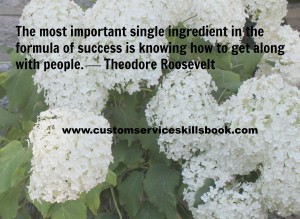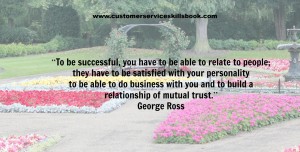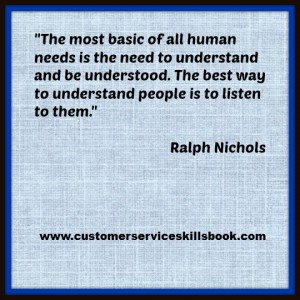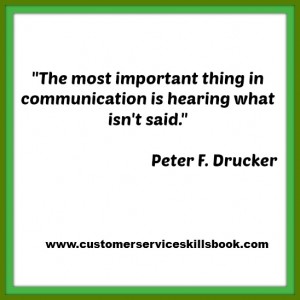Interpersonal Communication Quote – Theodore Roosevelt
The most important single ingredient in the formula of success is knowing how to get along with people. — Theodore Roosevelt, Theodore Roosevelt, Jr. (1858 – 1919), also known as ‘Teddy’, was an American statesman, author, explorer, soldier, naturalist, and reformer.
He served as the 26th President of the United States from 1901 to 1909.
As a leader of the Republican Party during this time, he became a driving force for the Progressive Era in the United States in the early 20th century.
Theodore Roosevelt Famous Quotes To Enjoy Reading:
- “Do what you can, with what you have, where you are.”
- “It is not the critic who counts; not the man who points out how the strong man stumbles, or where the doer of deeds could have done them better. The credit belongs to the man who is actually in the arena, whose face is marred by dust and sweat and blood; who strives valiantly; who errs, who comes short again and again, because there is no effort without error and shortcoming; but who does actually strive to do the deeds; who knows great enthusiasms, the great devotions; who spends himself in a worthy cause; who at the best knows in the end the triumph of high achievement, and who at the worst, if he fails, at least fails while daring greatly, so that his place shall never be with those cold and timid souls who neither know victory nor defeat.”
- “It is hard to fail, but it is worse never to have tried to succeed.”
- “Believe you can and you’re halfway there.” Theodore Roosevelt
- “When you’re at the end of your rope, tie a knot and hold on.”
- “People don’t care how much you know until they know how much you care”
- “The only man who never makes mistakes is the man who never does anything.”
- “Nothing in the world is worth having or worth doing unless it means effort, pain, difficulty… I have never in my life envied a human being who led an easy life. I have envied a great many people who led difficult lives and led them well.” Theodore Roosevelt
- “To announce that there must be no criticism of the President, or that we are to stand by the President, right or wrong, is not only unpatriotic and servile, but is morally treasonable to the American public.”
- “To educate a person in the mind but not in morals is to educate a menace to society.”
- “Knowing what’s right doesn’t mean much unless you do what’s right.”
- “Patriotism means to stand by the country. It does not mean to stand by the president or any other public official, save exactly to the degree in which he himself stands by the country. It is patriotic to support him insofar as he efficiently serves the country. It is unpatriotic not to oppose him to the exact extent that by inefficiency or otherwise he fails in his duty to stand by the country. In either event, it is unpatriotic not to tell the truth, whether about the president or anyone else.”
- “Keep your eyes on the stars, and your feet on the ground.”
- “If you could kick the person in the pants responsible for most of your trouble, you wouldn’t sit for a month.”
- “In any moment of decision, the best thing you can do is the right thing. The worst thing you can do is nothing.”
- “Here is your country. Cherish these natural wonders, cherish the natural resources, cherish the history and romance as a sacred heritage, for your children and your children’s children. Do not let selfish men or greedy interests skin your country of its beauty, its riches or its romance.” Theodore Roosevelt
- “Courage is not having the strength to go on; it is going on when you don’t have the strength.”
- “Speak softly and carry a big stick; you will go far.”
- “Far better it is to dare mighty things, to win glorious triumphs, even though checkered by failure, than to take rank with those poor spirits who neither enjoy much nor suffer much, because they live in the gray twilight that knows neither victory nor defeat.”
- “I am a part of everything that I have read.”
- “I am an American; free born and free bred, where I acknowledge no man as my superior, except for his own worth, or as my inferior, except for his own demerit.”
- “No one cares how much you know, until they know how much you care” Theodore Roosevelt
- “The things that will destroy America are prosperity at any price, peace at any price, safety first instead of duty first and love of soft living and the get-rich-quick theory of life.”
- “Every immigrant who comes here should be required within five years to learn English or leave the country.”
- “A vote is like a rifle: its usefulness depends upon the character of the user.”
- “Whenever you are asked if you can do a job, tell ’em, ‘Certainly I can!’ Then get busy and find out how to do it.”
- “Never throughout history has a man who lived a life of ease left a name worth remembering.”
- “A man who has never gone to school may steal a freight car; but if he has a university education, he may steal the whole railroad.”
- “In the first place, we should insist that if the immigrant who comes here in good faith becomes an American and assimilates himself to us, he shall be treated on an exact equality with everyone else, for it is an outrage to discriminate against any such man because of creed, or birthplace, or origin. But this is predicated upon the person’s becoming in every facet an American, and nothing but an American…There can be no divided allegiance here. Any man who says he is an American, but something else also, isn’t an American at all. We have room for but one flag, the American flag… We have room for but one language here, and that is the English language… and we have room for but one sole loyalty and that is a loyalty to the American people.” Theodore Roosevelt
- “When you play, play hard; when you work, don’t play at all.”
About Robert C. Lucas
Bob Lucas has been a trainer, presenter, customer service expert, and adult educator for over four decades. He has written hundreds of articles on training, writing, self-publishing, and workplace learning skills and issues. He is also an award-winning author who has written thirty-seven books on topics such as, writing, relationships, customer service, brain-based learning, and creative training strategies, interpersonal communication, diversity, and supervisory skills. Additionally, he has contributed articles, chapters, and activities to eighteen compilation books. Bob retired from the U.S. Marine Corps in 1991 after twenty-two years of active and reserve service.
Make Money Writing Books: Proven Profit Making Strategies for Authors by Robert W. Lucas at Amazon.com.
The key to successfully making money as an author and/or self-publisher is to brand yourself and your company and to make yourself and your book(s) a household name. Part of this is face-to-face interaction with people at trade shows, library events, book readings, book store signings, blogging or guest blogging on a topic related to their book(s). Another strategy involves writing articles and other materials that show up online and are found when people search for a given topic related to a topic about which the author has written.
If you need help building an author platform, branding yourself and your book(s) or generating recognition for what you do, Make Money Writing Books will help. Bob’s popular book addresses a multitude of ideas and strategies that you can use to help sell more books and create residual and passive income streams. The tips outlined in the book are focused to help authors but apply to virtually any professional trying to increase personal and product recognition and visibility.










